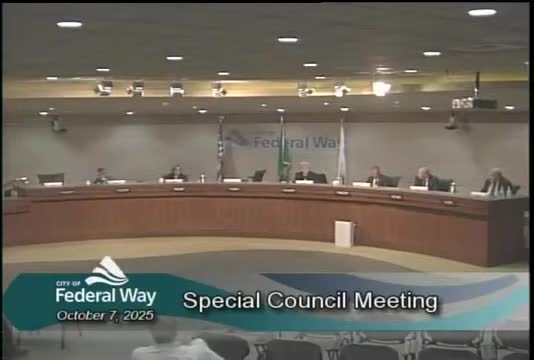WRIA 9 briefs Federal Way council on salmon recovery progress, funding and local restoration opportunities
Get AI-powered insights, summaries, and transcripts
Subscribe
Summary
At a special meeting Oct. 7, WRIA 9 planning and technical coordinator Matt Gehring briefed the Federal Way City Council on the watershed's salmon habitat plan, funding streams, recent accomplishments and possible shoreline projects in Federal Way. He highlighted the Howard Hanson Dam fish-passage effort as central to long-term recovery.
Matt Gehring, planning and technical coordinator for WRIA 9 (administratively housed at King County), told the Federal Way City Council at a special study session on Oct. 7 that the salmon-recovery plan has stabilized returning Chinook numbers from a 2009 low but remains well under the NOAA Fisheries recovery target.
"Salmon is our driving factor," Gehring said, explaining WRIA 9 prioritizes projects by Chinook needs while seeking multiple benefits such as recreation, water quality and flood protection.
The briefing summarized the 2021 update to the WRIA 9 Salmon Habitat Plan, recent funding and accomplishments, and potential local projects for the next 10 years. Gehring thanked the council for approving a 10-year extension of WRIA 9's interlocal agreement and said the ILA funding instrument produces about $600,000 annually for WRIA 9, of which Federal Way pays roughly 5.5 percent (about $32,000).
Gehring said funding from grants complements the ILA: about $4.2 million from the regional flood-control district, roughly $1.1 million from the state Puget Sound Acquisition and Restoration (PSAR) program, and about $300,000 annually from the Washington Salmon Recovery Funding Board. He said WRIA 9 has leveraged more than $200 million in watershed investments.
Gehring listed recent project outcomes tied to that investment: roughly 3.5 miles of levee setbacks, revegetation of over 500 acres, conservation of about 4.5 miles of marine shoreline and removal of roughly 1 mile of shoreline armor. He highlighted Camp Kilworth, a 29-acre acquisition funded at about $600,000, and Seahurst Park shoreline restoration as notable local efforts.
On salmon counts, Gehring said the Puget Sound Chinook population fell to fewer than 200 fish around February 2009 and has since stabilized into the low thousands; he cited a regular range of about 3,000 to 5,000 adult returns, still far below NOAA Fisheries' target of 27,000.
Council members asked about measurement methods and prospects for hitting the recovery target. Gehring said Washington Department of Fish and Wildlife and the Muckleshoot Indian Tribe perform spawning surveys from Auburn upstream to Howard Hanson Dam using foot surveys, boats and occasionally helicopters. He characterized the NOAA target as aspirational and said a regularly occurring run of 5,000—to 10,000 wild Chinook would be a step forward.
Gehring described the Howard Hanson Dam fish-passage effort as a cornerstone of regional recovery. He said roughly $250 million was appropriated for fish passage and that the U.S. Army Corps of Engineers has a design-build contract under way, but that negotiations and remaining funding remain unsettled. He said U.S. Sen. Patty Murray has advocated for the project in Washington, D.C.
Gehring identified several potential local opportunities for Federal Way, including a failing bulkhead at Dumas Bay Center that could be a candidate for shoreline-restoration work and improved public access, and climate-related acquisition work like that recently pursued in Normandy Park. He cautioned that shoreline projects are often multi-decadal efforts that require feasibility studies, funding and political support; the Seahurst restoration, he said, was completed in two phases (2007 and 2013) and took many years of prior planning.
Gehring closed by offering continued collaboration between WRIA 9 and Federal Way staff and councilmembers on project identification and implementation.
The briefing prompted questions from Councilmember McDaniel, Councilor Davitt and others. Councilmember Assefa Dawson, who requested the briefing, joined remotely and expressed support for WRIA 9's work.
